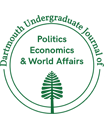Abstract
Margot Walström, Special Representative of the UN Secretary-General on Sexual Violence defines sexual violence as a "way of demonstrating power and control. It inflicts fear on the whole community. And it is unfortunately a very effective, cheap and silent weapon with a long-lasting effect on every society.” Despite the universal damage of sexual violence throughout history, international law did not begin to develop a response to such crimes until the 1990s. Worldwide fear and shame associated with atrocities of sexual violence, difficulty defining it across cultures, challenges to accurate data collection, and lack of collective action all contribute to the international community’s silence. This paper analyzes how sexual violence has been defined in international law through its integration into the international justice system: first, as torture by the International Criminal Tribunal for the Former Yugoslavia, and second, as genocide by the International Criminal Tribunals for Rwanda, and third, how the Rome Statute criminalized sexual violence in its establishment of the International Criminal Court. Additionally, this paper discusses how sex trafficking has been acknowledged by international law, primarily through the United Nations’ development of soft law. Finally, this essay examines how United Nations peacekeeping missions and other international institutions continually undermine the international community’s efforts to tackle sexual violence and trafficking.
Recommended Citation
Albach, Hannah Kate
(2021)
"Sexual Violence And Sex Trafficking: An Observation Of Developing International Law And Its Implementation,"
Dartmouth Undergraduate Journal of Politics, Economics and World Affairs: Vol. 1:
Iss.
3, Article 6.
Available at:
https://digitalcommons.dartmouth.edu/dujpew/vol1/iss3/6


